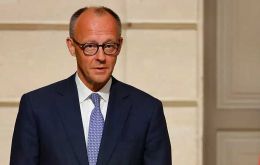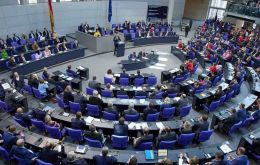MercoPress. South Atlantic News Agency
Tag: Friedrich Merz
-
Thursday, May 8th 2025 - 10:55 UTC
New German Chancellor wants EU-Mercosur deal expedited

Germany's newly appointed Chancellor Friedrich Merz traveled on his first day in office to Paris and Warsaw to further push for European unity. With French President Emmanuel Macron he discussed bilateral ties, European security, US trade tariffs, and the Ukraine conflict. He also supported the EU-Mercosur trade agreement, despite France's reservations due to environmental concerns.
-
Wednesday, May 7th 2025 - 08:46 UTC
Friedrich Merz becomes Germany's new Chancellor

Friedrich Merz of the Christian Democratic Union (CDU) was elected Chancellor of Germany on Tuesday after the second round of Bundestag voting, in which he was given 325 endorsements (thus surpassing the 316 minimum requirement), with 289 rejections and one abstention. No prospective chancellor in post-war Germany had previously failed the first vote after securing a coalition agreement.
-
Thursday, March 20th 2025 - 05:58 UTC
Germany voted to rearm, but can the 'rule of law' be kept alive?

By Gwynne Dyer - After the Second World War, the “rule of law” prevented borders from changing, explains Gwynne Dyer, but it's at risk due to Trump. On March 18, there was a vote in the Bundestag, the lower house of the German parliament that may have changed the course of history. When the vote came out ‘Yes’, you could feel the tectonic plates shift. Germany has voted to rearm.
-
Monday, February 24th 2025 - 09:49 UTC
Conservative coalition prevails over far-right AfD in German elections

Friedrich Merz, the candidate of the conservative coalition made up of the Christian Democratic Union (CDU) and the Christian Social Union (CSU) prevailed with 28.5% of the vote in Sunday's elections in Germany, thus averting for now the access to power of the far-right AfD (Alternative für Deutschland), for whom US Department of Government Efficiency (DOGE) Chief Elon Musk had strongly campaigned. The election saw an 83% voter turnout, the highest since German reunification in 1990.
